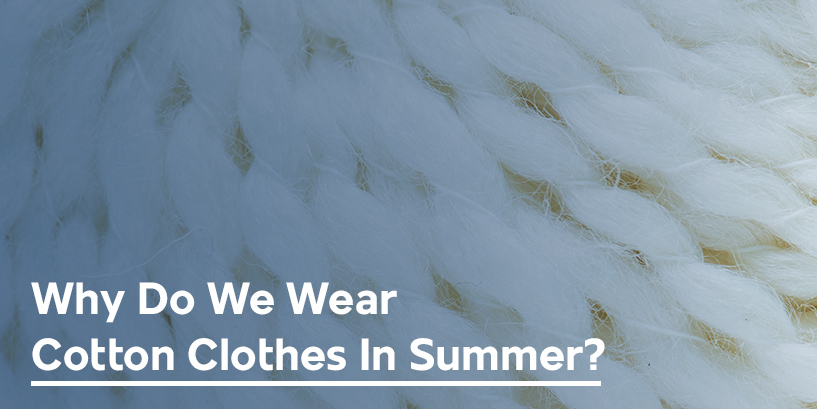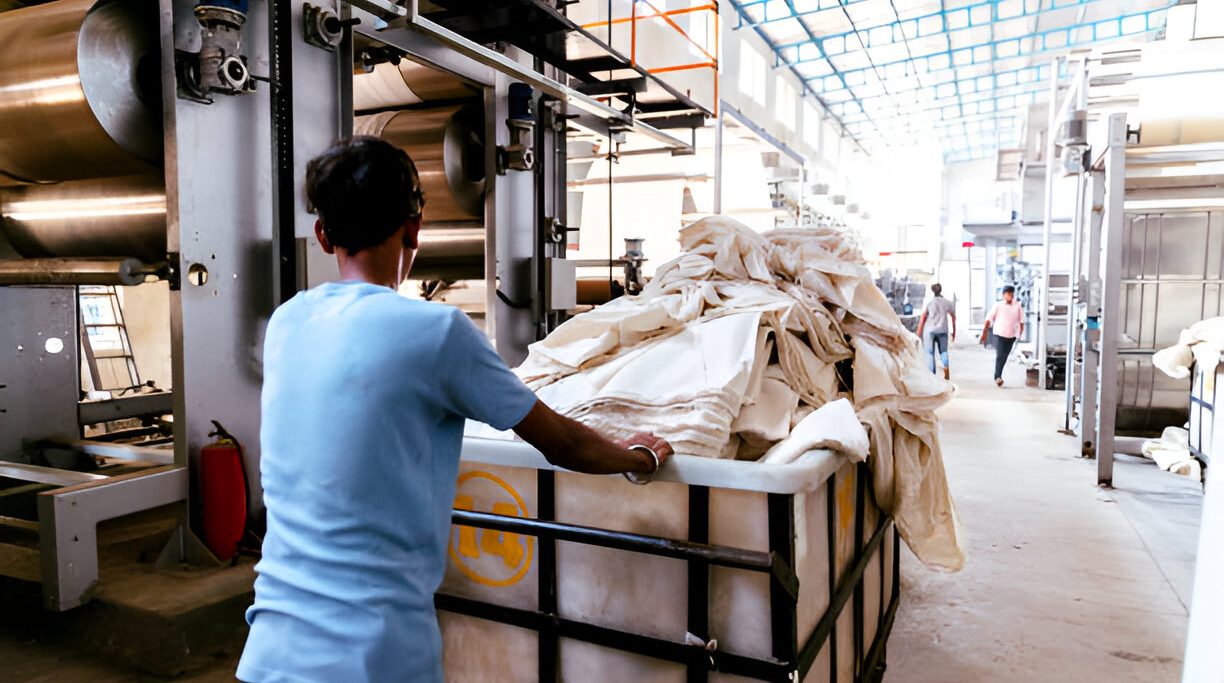The term ‘cotton’ comes from the Arabic word ‘qutun’, which refers to any delicate textile. Cotton balls and pieces found in Mexico, Peru, Indus River Valley, prove that people have been using this staple fibre for more than 7000 years.
So, it is evident that the usage of cottonwear has long been part of the social semiotics of apparel. Moreover, sustainable fibres have become a priority in the modern climate-conscious discourse. But why do we wear cotton clothes in summer?
Listed below are some of the most common reasons. Take a look!
Breathable Attire
Cotton clothes are known for their high water-absorbing abilities. During the warmer seasons, people tend to sweat more than usual. Since cotton allows more air circulation, the perspiration-induced bodily fluid gets absorbed and expelled fast. The latent heat of the moisture evaporation comes from the body. So, with sweat evaporation, the body temperature drops. As a result, cotton garments offer a cooling effect when worn in summer.
Safe for Sensitive Skin
Exposure to extreme heat often results in allergic reactions in the human body. For example, wearing synthetic fabrics at higher temperatures might cause rashes and skin hypersensitivity. Cotton products, on the other hand, have negligible adverse effects on your skin.
Dresses made up of organic cotton are manufactured without using any harmful chemicals. Additionally, this fibre is hypoallergenic, so it doesn’t cause any allergic reaction to your skin. All these features make cotton apparel the first choice in summer.
Further, cotton is used to make medical products like facemasks, bandages and gauges as it prevents them from causing skin irritation at higher temperatures.
Comfort Wears
The cotton fibre is comparatively finer than other fibres. So, clothes made out of this fabric are quite soft. In addition, these are more stretchable than synthetic attires and do not trap moisture like their polyester counterparts. Hence, cotton dresses can provide maximum comfort during a hot and humid day.
Durable
As humid weathers result in excessive perspiration, clothes are generally put through increased washing cycles during summers. Cotton fabrics have high tensile strength, ensuring they don’t wear out fast. When wet, the degree of crystallinity of the fibre increases. Further, the hydrogen bonding between the molecules in the crystalline areas in cotton ensures that the molecules are not perforated by water.
Child-friendly
Kids spend a considerable amount of time outdoors in the sun. During summers, this overexposure might cause sunburns, blisters, and rashes. The breathable nature of cotton attires ensures that a child’s body temperature remains regulated. In addition, the cotton attires work as a barrier to direct sunlight, ensuring the harmful elements do not affect the children adversely.
Further, newborn babies are susceptible to baby acne. Although it is harmless and clears up on its own, paediatricians suggest some protective measures to ensure the child’s comfort. For example, it is helpful to dress the baby in loose-fitting cotton clothes during summers to lower the risk of overheating.
Providing Thermal Insulation
Cotton fabrics can reduce the level of heat transfer between two objects that are in thermal contact. Through this thermal insulation, cotton clothes can provide a comfortable experience during high temperatures. The fibres can contain air between them. They also hold back the clothing fabric from the skin. As a result, there is increased air between the skin and the dress’s fabric.
Consequently, the low thermal conductivity of cotton clothing has a cooling effect on the body during summers.
Being Weatherproof
As summer attires are subject to weather extremities, it is essential to use weather-resistant clothing. Cotton fabrics are the ideal material for manufacturing such clothes. Moreover, cotton attires with a weather-repellent finish can sustain their breathability. So, the comfort level remains intact. Further, the cotton material ensures that the dress doesn’t rot from the damage caused by moisture during humid weather conditions.
Versatility
Cotton is used heavily to design a diverse array of comfortable attires suitable for your evolving needs, from workwear to performance fabrics or even leisurewear. This fibre is also woven, blended and knitted into denim, corduroy, chambray, lace and velour to produce comfortable textile products.
Why Do We Wear Cotton Clothes in Summer – 4 Unique Selling Points of Cottonwear
Cottonwear has some unique aspects that make them a must-buy product during summers.
Odour-Free
During your day-to-day activities, your clothes end up absorbing odours. Since warmer weather leads to increased perspiration, synthetic or polyester products can produce a putrid aroma. Alternatively, cotton clothes can release these substances comparatively faster. So they help you remain odour-free during summertime.
Non-clingy Materials
The imbalance of electric charges within the surface of two different materials leads to the production of static energy. Due to this, lighter objects are prone to clinging to other objects. This tendency is generally referred to as static cling.
Static cling can be seen in synthetic clothes, as synthetic fibres can hold an electric charge. However, since the cotton fabric cannot do so, the attires made with it do not cling to other objects. As a result, the clothes neither stick with each other nor stick to your body in hot and humid surroundings.
High-tech
Textile remains a quintessential manufacturing technology as it has a long-ranging effect on several versatile industries. When it comes to creating new and comfortable outfits for the warmer weather, the notion of smart textile has become a part of the conversation. Also referred to as functional textiles, these products can respond to environmental stimuli.
Suffice to say that the functional fabrics are designed to cater to specific performance requirements. As the name suggests, the primary goal here is its functionality and not the aesthetic value increment. Therefore, the combination of electrical, thermal, mechanical, and optical phenomena is essential to designing such attire.
Experts have long believed cotton to be the ideal material for functional fabrics. As it has longevity, heat-resistant nature and blending suitability, cotton remains the frontrunner to produce comfortable attire marketed explicitly for the summer season.
Antimicrobial Activity
The fashion-market colloquy of recent times has given great importance to the antimicrobial nature of cotton fabrics. Antimicrobial activity generally refers to the principles that stop bacterial growth and resist microbial colonies from forming. These elements are also able to destroy microorganisms.
The summer season witnesses a rise in bacterial count in the atmosphere. As the overall climate generally gets hotter, bacteria can sustain themselves better and even start replicating swiftly.
Experts have conducted thorough research and come to the conclusion that treated cotton fabrics are highly effective against some microbes. For example, surface-modified fibres like triclosan and silver-based finished cotton have shown antimicrobial activity of over 98% for bacteria like E. coli and S. aureus.
It is clear why cotton fabric emerged as the fashion market’s bellwether. The material has been trusted by manufacturers and consumers alike to provide complete user satisfaction. All over the world, around 40% of the total clothing manufactured is primarily dominated by cotton wear. Almost three-fourths of the world’s cotton is used by the apparel industry.
So, it is sufficient to say that cotton outfits remain the best wardrobe choice for warmer seasons.
Frequently Asked Questions
Are cotton products good for hiking during summers?
Loose-fitted cotton attires are helpful for hot weather trekking. Cotton is a moisture-wicking fabric that uses built-in capillaries to pull away the moisture from the skin.
Can cotton products be used as sportswear in summer?
Breathable fabric made of extra-long staple cotton is waterproof. The swelling of wet fibres prevents water passages. So, we wear cotton clothes in summer as sportswear since cotton blends, such as poly-cotton, are effective sweat-absorbent performance gears with optimal comfort.
Why is cotton preferred for innerwear manufacturing?
Innerwears are hygienic layers and used for next-to-skin clothing. So, naturally, these products need to be able to reduce the chances of dermatitic skin reactions. All-natural fibre of cotton products ensures that the garments do not cause any infection or skin irritation.



